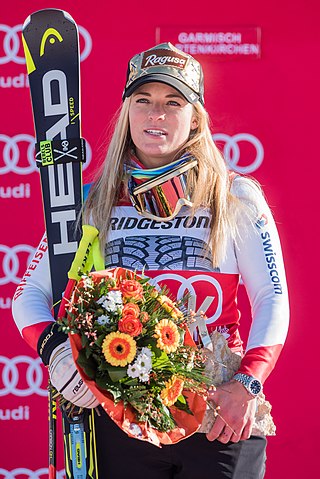
The women's super-G in the 2021 FIS Alpine Skiing World Cup consisted of 6 events, with one cancellation from the scheduled seven. Swiss skier Lara Gut-Behrami won four of the first five Super-Gs to establish an 195-point lead over Swiss teammate and defending discipline champion Corinne Suter with only two races to go, and she clinched the discipline title for 2021 after the sixth event, which turned out to be the last one for the season.

The women's giant slalom in the 2021 FIS Alpine Skiing World Cup consisted of 8 events including the final in Lenzerheide, Switzerland. The original schedule had included nine events, but a race in Semmering had to be cancelled after the first run had already been completed when hurricane-force winds moved in and caused significant damage, including to the timing equipment.

The women's parallel competition in the 2021 FIS Alpine Skiing World Cup consisted of only 1 event, a parallel giant slalom, due to the COVID-19 pandemic. The tentative schedule had called for three parallel events, but the other two were removed to limit the amount of travel during the pandemic.

The men's downhill in the 2021 FIS Alpine Skiing World Cup consisted of seven events. The original schedule had contained nine downhills, but a rescheduled one on 5 March in Saalbach-Hinterglemm, Austria, was canceled due to fog and continual snowfall after just nine skiers had finished, and the downhill during World Cup finals week was also canceled.

The men's super-G in the 2021 FIS Alpine Skiing World Cup consisted of six events, although seven had been originally scheduled.

The men's giant slalom in the 2021 FIS Alpine Skiing World Cup involved ten events, as scheduled.

The men's giant slalom in the 2020 FIS Alpine Skiing World Cup involved seven events, as the last two scheduled giant slaloms in the season were cancelled.

The men's slalom in the 2020 FIS Alpine Ski World Cup involved only nine events, as the final three scheduled slaloms of the season were cancelled.

The Men's combined in the 2020 FIS Alpine Skiing World Cup involved 3 events, all of which were completed before the season was halted due to the COVID-19 pandemic. A major change was made in the discipline this season due to the recent dominance of slalom specialists in the combined over speed racers. As was previously the case, the first run continued to be the speed discipline. The second run then started in reverse order of finish in the speed run, which allowed the slalom specialists to tackle fresh snow as the first down the hill in the slalom run, while the speed specialists had to face the more challenging rutted snow at the end of the day, as the last skiers of the 30 who qualified for the second run. Instead, the second run was changed to start in the same order as the finish of the speed run, so that the leader after the speed run became the first to race on the fresh slalom course.

The men's parallel competition in the 2020 FIS Alpine Skiing World Cup was contested as a World Cup discipline separate from slalom for the first time in 2020. Prior to the season, FIS decided to combine parallel skiing events into a new discipline, joining the existing disciplines of downhill, Super-G, giant slalom, slalom, and combined. The discipline winner would receive a small crystal globe, similar to the other disciplines. However, at the same time, FIS decided to drop the city events to reduce the amount of travel required during the World Cup season, planning to replace them with more parallel events at regular venues.

The women's parallel competition in the 2020 FIS Alpine Skiing World Cup was contested as a World Cup discipline separate from slalom for the first time in 2020. Prior to the season, FIS decided to combine parallel skiing events into a new discipline, joining the existing disciplines of downhill, super-G, giant slalom, slalom, and Alpine combined. The discipline winner would receive a small crystal globe, similar to the other disciplines. However, at the same time, FIS decided to drop the city events to reduce the amount of travel required during the World Cup season, planning to replace them with more parallel events at regular venues.

The women's parallel competition in the 2022 FIS Alpine Skiing World Cup consisted of only 1 event, a parallel giant slalom, due to the continuing COVID-19 pandemic. The sole event was won by Andreja Slokar, who thus won the season championship. Because only one race was run, Slokar will not be awarded a crystal globe for winning this discipline. This specific championship includes both parallel giant slalom and parallel slalom races. At this time, individual parallel races are not included in the season finals.
The men's parallel competition in the 2022 FIS Alpine Skiing World Cup involved only 1 event, a parallel giant slalom, due to the COVID-19 pandemic. The sole event was won by Christian Hirschbühl of Austria, who thus won the season championship. However, because there was only one race, Hirschbühl did not win a crystal globe symbolizing his championship. This specific championship includes both parallel giant slalom and parallel slalom races. At this time, individual parallel races are not included in the season finals.

The men's slalom in the 2022 FIS Alpine Skiing World Cup consisted of ten events including the final. However, the slalom scheduled in Zagreb on 5 January was first delayed until 6 January due to bad weather and then cancelled in the middle of the first run due to additional bad weather, leading to its removal from the schedule. Eventually, however, it was rescheduled for Flachau on 9 March, restoring the season to 10 events.

The men's slalom in the 2019 FIS Alpine Skiing World Cup involved 12 events, including two parallel slaloms (both city events}. Marcel Hirscher of Austria won his sixth championship in the discipline, all in the prior seven years, on the way to his eighth straight overall men's championship. During the season, Hirscher had hinted at retiring after it, and before the start of the next season, he did announce his retirement.

The women's slalom in the 2019 FIS Alpine Skiing World Cup involved 12 events, including three parallel slaloms. At the end of the season, a new discipline was created for parallel races.

The men's giant slalom in the 2019 FIS Alpine Skiing World Cup involved nine events, including a parallel giant slalom. After this season, all parallel races were moved into a separate discipline. Marcel Hirscher of Austria won three of the first four races this season and easily won the discipline for the fifth straight season, his sixth total win in this discipline, on his way to his eighth straight overall World Cup championship.

The men's giant slalom in the 2018 FIS Alpine Skiing World Cup involved eight events, including a parallel giant slalom. Marcel Hirscher of Austria won six of the races this season and easily won the discipline for the fourth straight season, his fifth total win in this discipline, on his way to his seventh straight overall World Cup championship. Hirscher clinched the victory after winning the next-to-last race of the season in Kranjska Gora, Slovenia.

The men's giant slalom in the 2017 FIS Alpine Skiing World Cup involved nine events, including the second-ever parallel giant slalom and the season finals in Aspen, Colorado (USA). Marcel Hirscher of Austria won four of the races this season and finished second in four others, easily winning the discipline for the third straight season on his way to his sixth straight overall World Cup championship. Hirscher was so dominant during the season that much of the focus in the news coverage by the end of the season was about his desire to continue, considering the pressure on him to win.

The men's giant slalom competition in the 2016 FIS Alpine Skiing World Cup involved eleven events, including the first-ever parallel giant slalom and the season finals in St. Moritz, Switzerland. The newly introduced Parallel giant slalom event at Alta Badia, Italy was a relatively short Giant slalom course that pitted the men against one another in a modified bracket-reduction format from a field of thirty-two qualifying skiers, eventually whittled down to just four final-round racers in a "large final" and a "small final".











